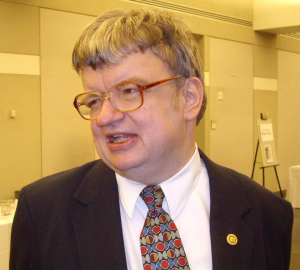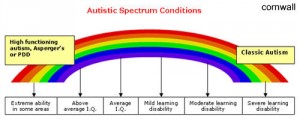If you read the title of this article, you are probably wondering what a savant actually is, so here it goes; a savant is someone who suffers from the formal medical condition known as savant syndrome. This affliction occurs when someone with a certain developmental disability, ranging from autism to down syndrome, has capabilities far more reaching than the average human being. Essentially, those suffering from savant syndrome have lower IQ test scores than the average person, while outperforming said average person tenfold in any specific given area, such as memory, art, rapid math calculations, or music.
This chart shows the spectrum of autism; all the way to the left are the cases of autism associated with extreme talent in given areas, which, in this case, is savant syndrome. As you can see, however, most of the cases of autism are not correlated with some level of genius. As a matter of fact, the chart further proves the rarity that is savant syndrome; there are less than 200 savants on the planet, making savant syndrome one of the rarest medical conditions in existence.
*With the previous information in mind, I hypothesized that savant genius has a direct correlation with some malfunction in some order of the brain. In other words, it is not passed down from generation to generation through a family tree.
So why are savants truly smart? Is it a brain mutation, or is it hereditary?
One of the most notable (and awesome) examples, taken directly from the Wisconsin Medical Society article right here, was Kim Peek, a savant who had extraordinary abilities to memorize everything that he laid his eyes on. Growing up, Peek’s doctors seemed convinced that he was bound to be a failure, going as far as recommending that he be “institutionalized” due to his ever-present mental disability. However, by the tender age of 6, Peek had already fully memorized nearly eight encyclopedias that his family had at their home, and only eight years later, at the age of 14, had he finished an entire high school curriculum. Today, he has memorized many different kinds of books and pieces; these include The Bible, all Shakespearean works, and all roads and routes within the United States. Impressive, right?
Watch this documentary about Kim Peek, and I promise you that you will be amazed!
 Why are savants, like Kim Peek, so smart? Well, Adam Piore expertly explicates the reasons behind the answer in his article post right here. In it, he writes about how behavioral neurologist Bruce Miller, director of the University of California San Francisco Memory and Aging Center, has found a direct correlation between certain levels of genius and dementia in his patients. As a matter of fact, one of his cases in 1990 dealt directly with a man who, as his Alzheimer’s disease worsened and his symptoms increased, began to create art that progressively became better and more articulate. What’s more is that this increased work came without any correlated practice; simply, one day his artwork was considered average, and within the next days, his work was considered genius in the art community.
Why are savants, like Kim Peek, so smart? Well, Adam Piore expertly explicates the reasons behind the answer in his article post right here. In it, he writes about how behavioral neurologist Bruce Miller, director of the University of California San Francisco Memory and Aging Center, has found a direct correlation between certain levels of genius and dementia in his patients. As a matter of fact, one of his cases in 1990 dealt directly with a man who, as his Alzheimer’s disease worsened and his symptoms increased, began to create art that progressively became better and more articulate. What’s more is that this increased work came without any correlated practice; simply, one day his artwork was considered average, and within the next days, his work was considered genius in the art community.
In addition, it is clear that savants and dementia patients share the same defects in social and mental atmospheres; both seem to be compulsively drawn to whatever skill(s) they possess, while being severely lacking in language behaviors. That means that one can assume that savants and dementia patients most likely have more in common, as well, such as the brain mutations that cause them. Miller actually studied brain samples of young savants that began exhibiting extraordinary skills, and to nobody’s surprise, the scans drew a direct correlation to dementia; the scans showed that in the anterior temporal lobes, there were portions that were inactive.
What does this discovery mean for the scientific community, though? Well, essentially, much like other diseases and afflictions, once it has been concluded to be extremely similar to another disorder, doctors and scientists can study it with more background knowledge in hopes to learn even more. In extraordinary cases, correlations between diseases can even lead to cures! In this specific example, the link from savant genius to dementia might help to better understand Alzheimer’s and other problems that eventually arise within the brain due to age. If scientists continue to study this syndrome, perhaps they can learn how they acquire such talent or skill in specialized areas, which might, in-turn, create ideas for future medications in patients that demonstrate its need.
Perhaps if a scientist wanted to draw more conclusions on the similarities between savants and dementia patients, he could introduce them too each other and observe their interactions and behaviors; since they both express similar personality behaviors and lack of social skills, maybe how they interact with each other might lead to new discoveries in either the savant or the dementia patient.
The Science Behind Savant Syndrome: Correlation and Causation
Remember when Andrew was lecturing about the worms and whether or not there was a valid correlation between worms and the stupidity within kids? Did the worms cause kids to be stupid, or were the stupid kids just more likely to get worms? This very principle, correlation and causation, could be applied to the science between savant syndrome and the measure of genius a savant has.
According to the same article from the link above, the more severe and serious the savant syndrome found in a person, the more extraordinary the ability he is gifted with. The example used in the article is of a man named Derek Amato, who, at the age of 39, slammed his head against the concrete floor of his pool and acquired savant syndrome. In comparison to many other savants who were born with the affliction, he somehow contracted it after extensive brain damage through a concussion. Thus, there is a clear correlation between the method that the syndrome was contracted and the extensive extraordinary ability acquired. It is also a safe assumption that reverse causation, which is the predicament of a reversal chain of consequence, is not a factor; there is no way that the ability causes the syndrome, only vice versa. One has to acquire savant syndrome in order to get the given ability, not the other way around.
Deductions from Personal Experience
Personally, I have never come into contact with a savant; I have, however, come into contact with geniuses, which, for the purpose of my argument, are extremely similar. I am always in awe of how quickly they are able to pick up course material. For example, while it would take me a couple hours to study for an upcoming exam, for some of my friends that were in the gifted program at my school (East Stroudsburg High School North), it would take one hour maximum! I would try to comprehend how they would do it and consistently ask them for their study habits, but my inquiries would come with simple replies like “I don’t know how I do it” or “It was really easy!” When my friends would respond like this, I would just roll my eyes and think to myself “they don’t even realize how smart they really are!”
Regardless, everyone is gifted in his own way; whether it be in a specific sport, a genre of art like music or sculpting, or even singing and acting, people from all over the world have their own special talents. After speaking with my roommate about some of the genius friends we have at home (we came from the same area and high school), we came to the mutual agreement that no matter what you think of yourself and your talents, there is something special in everyone!
Links for Pictures
https://raisinganonconformist.wordpress.com/page/3/
https://en.wikipedia.org/wiki/Kim_Peek
http://www.adventuretravelnews.com/you-win-some-you-lose-some-2014s-best-experiments-in-adventure-travel
Link for the Introduction Paragraph Information
https://en.wikipedia.org/wiki/Savant_syndrome


